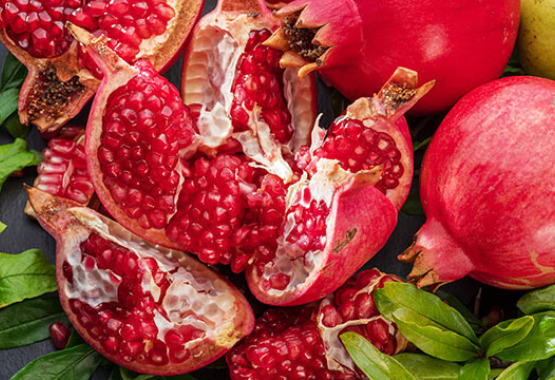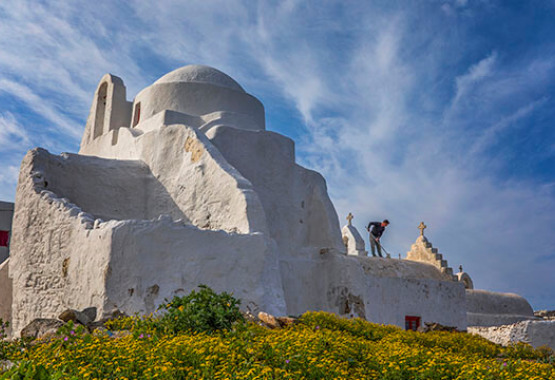Christmas holidays in Greece
Celebrating Christmas and New Year’s Eve in Greece is like finding yourself in an expressionist work of art: decorated Christmas trees, shiny bright ornaments, and “karavakia” (small-scale Christmas boats) decked with blue and white lights illuminate our streets; melodious bell ringing and children singing Christmas Carols are heard in Greek cities and villages. Traditional culinary delights symbolise good luck in the New Year and adorn our festive white-clothed tables. In this colourful Christmas atmosphere, the holiday experience is made all the more memorable when you’re surrounded by the deep blue of the Greek seas, the mountainous green forests, the red & coral shades of the sunset, and the rich violet of the night sky.
Let’s try to recreate this atmosphere by taking a short trip to some of the places where age-old Christmas customs still survive:
Be aware of the hobgoblins: Greece’s hobgoblins are called kalikantzari, friendly but mischievous little creatures who look like elves; they surface on Earth only during the 12-day period from Christmas to Epiphany Day (January 6). According to Greek legend, these creatures’ origin is the centre of the earth, and their mission is to chop the huge trunk of the tree of life, and eat the roots that hold the Earth in its place. During this period they surface from underground and they love to hide in people's houses slipping down the chimney. Kalikantzari are very naughty, and they like doing things that frighten and disgust people, like overturning furniture, making Christmas dishes filthy, or contaminating the water. Throughout Greece, people try to keep the hobgoblins away from their homes. In some places housewives sprinkle holy water in every room of the house to scare kalikantzari away.
In others, like the island of Kefalonia, women burn incense at the front door of their houses making the sign of the cross in order to repel these undesirable guests. Kalikantzari disappear from the surface on Epiphany Day when all the waters are blessed, as they are forced to return underground. However, due to the miracle of Christ's birth, they find the earth's tree trunk completely restored, so they start their mission to destroy it all over again.
Follow a Dionysiac rite: In Kastoria, people recreate a three-day Dionyssian custom (6th-8th January), called “ragoutsaria” (from the Latin verb “rogo” meaning “to ask”). If you want to be part of this feast, you have to disguise yourself and wear scary masks in order to ward off evil spirits. Go from house to house, from village to village, and ask people to reward you for protecting them from evil entities. While “fighting malevolent spirits” eat, drink, dance and sing to the rhythm of traditional tunes as the folk musicians fill the city’s streets accompanied by the locals.
Don’t attempt to put off these fires: In Kranohori village, on Christmas Eve huge pyramid shaped bonfires are lit, called “boubounes”. Take a swig of the local wine and enjoy traditional delicacies. In the village of Agios Panteleimonas in Florina, on the 23rd of December, the locals divide into groups and light bonfires at midnight. Everyone dances and celebrates Christmas around these mesmerizing outdoor fires.
Have the meal of brotherhood in Tinos: A custom that takes place every year on the 25th of December. During a symbolic meal, which only the men of the village and the priest attend, friendship and solidarity are praised. During this celebration, an icon of Christ is venerated in a warm atmosphere of Christmas hymns and gentle candlelight.
Attend customs influenced by ancient ceremonies held in honour of Demeter: The re-enactment of a local wedding ceremony takes place in the village of Volakas, in Drama, on the 8th of January, a day also dedicated to the midwives. Children, open your presents on New Year's Day: On the 1st of January children in Greece receive their presents; this day is also dedicated to St. Basil because he is Father Christmas, and everyone called Vassilis (boy's name) or Vassiliki (girl's name) celebrates his/her name day.
In the warm atmosphere of a Greek family, you will witness rituals for good luck: The so-called “podariko” (first footing), the hanging of the “kremmida” (big onion) outside the door, and the “breaking of the pomegranate” are the most characteristic. Both “kremmida” and pomegranate carry heavy symbolic meanings from ancient times representing prosperity, abundance in the family, and also bring good luck to one's descendants.
On New Year's Day, Greeks break a pomegranate on the doorstep before entering their houses (an action which is sometimes performed by the bride in some regions of Greece when she arrives at her new home after the wedding); or they hang a “kremmida” outside their doors on New Year's Eve. The next morning the father or the mother of the family wake up their children by gently tapping them on the head with the “kremmida”, then they all go to church to attend the liturgy held in commemoration of St. Basil. Savour a piece of St. Basil's Pie (Vassilopita) and find out if you are going to be lucky: A special cake is eaten on New Year’s Day in which a lucky coin, the “flouri”, is baked. Before you start searching for your lucky coin, the head of the house must first cross the cake with his knife and then cut the first slice for God, then the next for the baby Christ, followed by the “Panayia” (Virgin Mary), then the next slice for the house and after a slice for each member of the family starting with the eldest. If you find the “flouri” in your piece of cake good luck will follow all the forthcoming year. A specially decorated bread also adorns the festive table; it is called “Vasilopsomo” (St. Basil's bread), and is actually identical in form to the “Christopsomo” (Christ bread) served on Christmas Day.
It’s time for the “kallikantzari” to leave the surface of the Earth: The Greek Christmas celebrations conclude with the festival of “Ta Phota” (the Lights) as Epiphany is called, a feast as important as the baptism of Christ. On the Eve of this day, the priest will visit houses and sprinkle holy water to bless them and the family members. This service is known as “agiasmos”: this is also the name of the holy water which Greeks keep with the family icons. Throughout Greece the Epiphany is celebrated in Byzantine splendour and religious awe.
Churches large and small, are magnificently lit and echo with the joyful melodies of bells. In some larger churches a pair of doves are released from the bell tower. During the ceremony, a cross is thrown in the waters –sea, lakes or rivers– in a ritual that revolves around the Great Blessing of the Waters. An impressive custom follows: any number of volunteers may dive and try to recover the cross. Whoever finds the cross returns it to the priest, who then delivers a special blessing to the swimmer and their household. The celebrations are accompanied by the sweet melodies of the Epiphany carols sung by children. The next day is dedicated to the great feast of St. John the Baptist, when the numerous Johns, Joans or Joannas celebrate their name day.
You can always be a passionate city lover: In the midst of the mild Athenian winter, immerse yourself in open-air celebrations: free concerts in Syntagma Square, and dancing in the ouzeries and tavernas in Plaka and Psiri; light up your nights: all the clubs put on rembetika (urban music), laika (mainstream popular music) and jazz/blues/rock shows; shop your heart out in Ermou, Monastiraki, or Kolonaki listening to the music played by the street musicians; or just stroll around archaeological sites and relax relishing a fine meal outdoors. Santa and his reindeer will be waiting for children to pose with for photos; cheeky hobgoblins will guide them through Earth’s Christmas forest. From Athens, you can also take a cruise to nearby islands, go skiing on Mount Parnassos, or make short –yet memorable– trips around the mainland to Delphi, Meteora or Nafplio.





